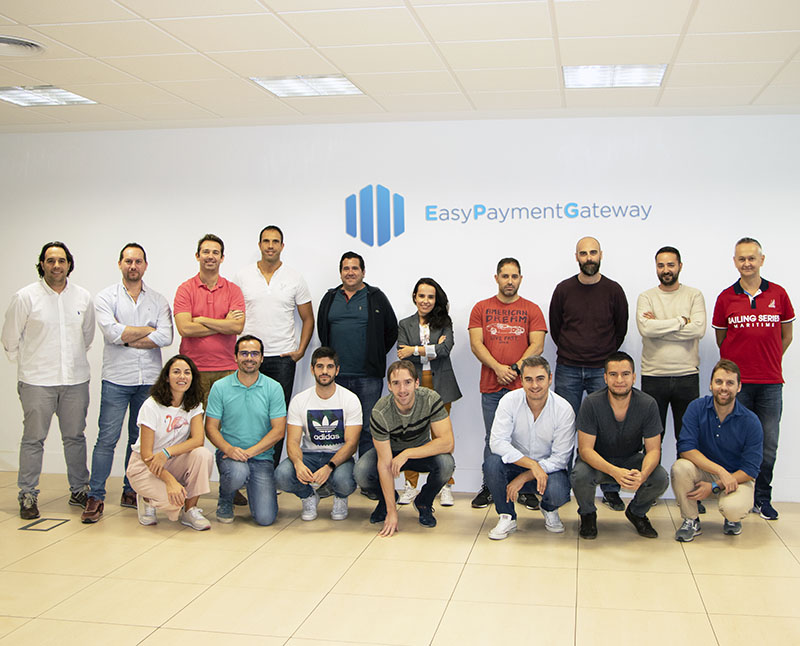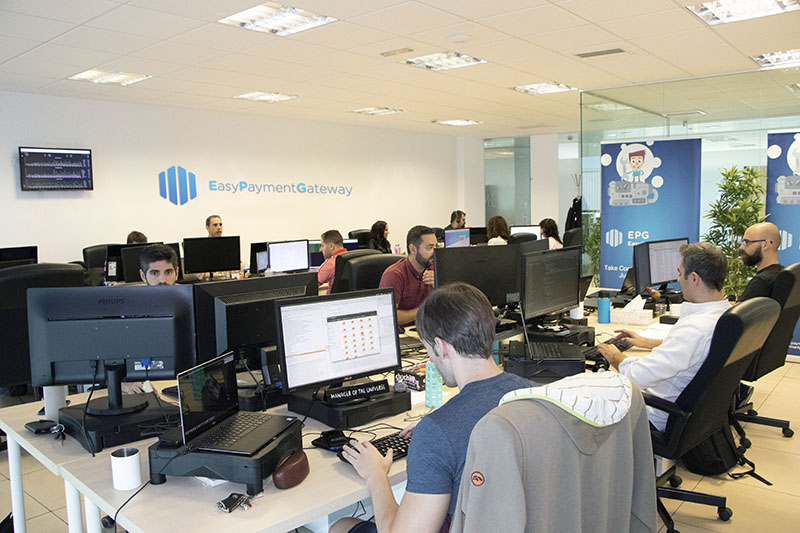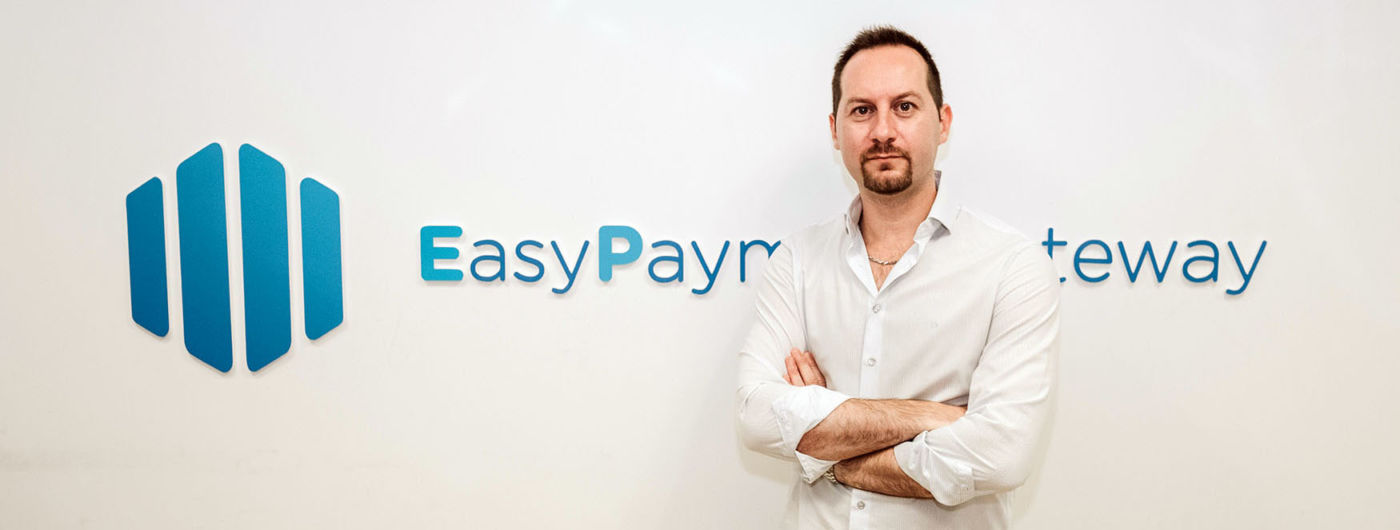At Fintech.gi we keep one eye on the firms riding high on a global level and the other one fixed on those firms making waves locally. With this in mind, Gibraltar’s Easy Payment Gateway is a company that we have both eyes firmly set on. Founded in 2015, this local-born fintech company is enjoying success across the world.
Now in its fifth year, Easy Payment Gateway has processed over $7billion and offers hundreds of different alternative payment solutions, worldwide acquirers and KYC providers as well as credit card processing with a fully customizable checkout and cashier. Success stories do need to start somewhere though, and this particular story goes that its Founder and CIO, Alex Capurro, drew out the idea for the company with a biro before developing it into the powerful one-stop payment solution it is today.
We met Alex to ask him about what starting a fintech company in Gibraltar was like, what plans he has for the future and whether there’s any truth to the biro story.
Hello Alex, can you tell me a bit about yourself?
“I was born in London in 1979 to Gibraltarian parents and after spending most of my youth in Gibraltar, I started taking an interest in computer technology. Fast forward to now and I have been developing technology for the payments industry over the last 15 years and have founded companies such as Myriad Payments and 21FIFTY, both successful companies within the payments industry. I am the founder and CIO of Easy Payment Gateway, a company I founded back in 2015 which has already processed over $7billion within a range of different online business segments”.
Tell me about your early career, how did you come to get into this sector?
“I have a computer science degree (from the University of Leicester). When I graduated in 2000, I worked for the multimedia industry, which included (amongst many other projects) working on Playstation 2 games, one of the Star Wars movies (I got to work on some AI technology for R2D2) and the Stallone movie ‘Driven’ PS2 game adaptation. I came to Gibraltar on a 2 week holiday to visit my family which ended up turning into15 years as I applied for a development job at Victor Chandler.
“Initially, my job consisted of developing casino games, but that soon turned into developing fraud prevention software and the integration of different online payment methods. What I found during that time (around 2005) was that it was very tedious to integrate a new solution. Companies would take a lot of time, needed an experienced development team and would spend a lot of money. This was not efficient by any means, not to me as a developer and not to any company who needed new local solutions whenever they wanted to expand their business geographically.
“So I eventually came up with the idea of building a payment gateway platform that only required 1 integration, but offered multiple solutions across the globe. Thus I set up a company called Myriad Payments. In 2010 I left that company, which got sold and set up a payments consultancy company called 21FIFTY.”
Is it true that you actually drew out the payment gateway with a biro first?
“Ha – yes it is! During my four years of running 21FIFTY, I noticed that every single time I went to see a client I would end up drawing on a whiteboard, the flow of how they needed their payments logic to work. I’d always end up drawing a flow diagram which I then had to draw on paper, take back to the office and develop with my team. This led me to design and build my own tool that would essentially allow me to draw that flow diagram on the computer. The tool would then automatically create the logic and code based on that diagram so that myself and the client would not have to do any further development. Basically a tool that would allow any non-technical person to draw and define in real-time how they wanted their payments to work and would allow companies to connect to local payment solutions which offer them higher conversion rates and lower costs. This technology is now patented worldwide 🙂 That’s how it all happened.”

How were the first few years?
“Fun! I remember working many hours, late nights and having to come up with many innovative ways to allow companies, especially betting companies, to accept online payments. I remember I once had to design and develop a solution for Israel so that people could easily make payments around the world without being blocked. It was much simpler, there was no PCI compliance and regulations, but looking back, thankfully we have those things now as more and more payments are done online, meaning all that data HAS to be protected. But it was definitely a more creative time.
“At the same time it was tough, being a new payment company in such a busy space is tough. You are competing against giants such as Ayden, Worldpay etc. But none of them had the technology I was offering. In the end, finding the right partners and investors who helped me promote my company was key”.
What makes Easy Payment Gateway different from other payment platforms?
Our technology, 100%. The fact that we offer over 250 different payment solutions, credit card processors all over the world, as well as fraud prevention and an extremely powerful and simple back office for reporting and monitoring purposes, makes us a very unique proposition. We are the only independent gateway that allows companies to easily connect to any solution whilst defining their own rules and flows graphically. We empower merchants.”
You recently handed over the running of the company to an executive team led by Manuel Prieto, was this a hard decision?
“No, not at all. This was my own decision, against what the board and my investors wanted; I felt the need to leave the role of CEO for a number of reasons. First, I have been a CEO for 10 years, that involves a lot of travelling, late nights, meetings and basically missing out on my 10-year-old daughter growing up. I also have a 6-year-old boy and I felt like I needed to spend more time with them and my wife. On the other hand, I am a creative and technical person. I love designing and developing new products and features; being CEO did not give me time to do this which led to a few things being released by my company that I was not 100% happy with. It took me 2 years of searching, but once I met Manuel I knew he was the man for the job and so the transition for me has been very easy to assimilate and life-changing in a positive way. Something as simple as getting home by 6pm (typically…) and being able to play football with my son or be with my daughter is very rewarding for me, more than being a CEO will ever be.
“All that said, there is always a level of adaptation when handing over your ‘baby’ to someone else, but I’m very close to Manuel and we both have very similar ways of thinking. Manuel has also had it very clear from the very beginning that this is my company and as such tries his best to run it based on my ideologies, obviously under his own ways and rules of being a CEO.”
As one of Gibraltar’s early fintech pioneers, you now have a very global vantage point, what advice do you have for any upcoming fintech entrepreneurs?
“Always have a working product. It’s so important to have something that’s working before you try to go to market or before you attract investment. Going to find investment with a powerpoint is so much harder than showing a working product, even if it’s not 100% completed. Also, think outside the box. You don’t have to invent something totally new, you might find something that’s already out there but you can think of different ways of making it better or more efficient. I didn’t invent anything new, there are many gateways out there and there are software platforms that allow drawing of flow diagrams. But there isn’t a payment gateway that allows non-technical users to define the rules and logic via a graphical interface. that’s what I did.”
“Also, start bit by bit, focus on one area, one region of the world and one business sector. You can’t do it all at once, no matter how much you feel you want to. Walk before you run and make mistakes, you HAVE to make mistakes. Mistakes should not be seen as a failure, it is necessary, every mistake takes you one step closer to success. It can take you many mistakes and tries but only one to get it right. And don’t settle, don’t stop until you achieve what you want.
Also, keep an eye on regulation; as a fintech company you always have to be ahead of what’s coming, be it PSd2, GPDR or whatever, because those things can really throw a spanner in the works if you are not careful.”
What are some of the challenges faced by Gibraltar as it diversifies into the technology sector?
“Well for startups, Gibraltar is not an easy place. For one there is the legal aspect. Setting up a company in Gibraltar can be expensive when compared to other parts of the world; everything has to go through lawyers. Which takes me to the next point, lawyers. There are no law firms in Gib that really seem to understand what a startup is. Law firms can charge an obscene amount of money which is simply not realistic for startups. I’ve spent a huge amount of our budget on law firms which led me to hire our own in house legal counsel, but that’s something I was able to do this year, almost 5 years after I started. There is also no real advice when it comes to what type of SHA a startup needs that protects the founder and yet makes it attractive to investors. This is something which I struggled a lot with initially.”
“Finally there is the issue of office space, another thing which is extremely expensive here, not to mention the ridiculous 5 to 10-year lease contracts. No startup can commit to that if you have to spend a good % of your investment on that, it simply stops making sense. Thankfully we have a couple of coworking spaces now, but as a whole, office rent in Gibraltar is too expensive for any startup to consider. As an example, an office in Gibraltar of around 200m can be something like £7k a month plus a 5-year lease contract, whereas in Spain a similar office could be as little as €1,000 a month with a 12-month lease.”
“There is also the issue regarding the lack of local technical talent. It’s very difficult to find local developers, most of them have to be hired outside but that is also as an issue since you have to compete with the betting companies who are able to inflate salaries way beyond what they should be, meaning local companies are not able to compete. I’ve lost a handful of developers that we hired and formed after a year because a betting company based in Gibraltar offered double the salary I was offering. This is something that perhaps our Government could help with but don’t. Local technical people, who are few, tend to work for the government as well, which again is something we can’t compete with when it comes to added benefits (pensions, holidays etc). All these things have to be dealt with before Gibraltar can attract more startups.”
 Your website says that you’re developing a solution for Small Businesses, what can people expect from it and when will we see it?
Your website says that you’re developing a solution for Small Businesses, what can people expect from it and when will we see it?
“Basically, small online businesses that want to process online will be able to register automatically with us online and within seconds will have an account ready that they can then link to many of the solutions we offer to start processing. We are also 100% omnichannel, meaning we can process both online and also offline (in physical shops for example, although this is not deployed in Gibraltar yet due to the uncertainty of Brexit).”





